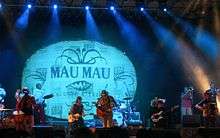Mau Mau (band)
Mau Mau is an Italian band from Turin,[1] formed in 1990 by Luca Morino (vocals and guitar), Fabio Barovero (accordion) and Cameroonian Tatè Nsongan (Djembe).[2][3] Born from the ashes of the underground cult group Loschi Dezi,[4] the band draws its influences from world music, especially Mediterranean, African, Arabic and Latin traditions.[2][5] They mainly sing in native Piedmontese.[2] The band's name has a double meaning: it references the Kenyan Mau Mau uprising against British colonial rule,[5] and in Piedmontese, Mau Mau designates "people who come from afar".
Mau Mau | |
|---|---|
 Mau Mau live at Mazdapalace, Milan on June 29, 2006 | |
| Background information | |
| Origin | Piedmont, Italy |
| Genres | Folk, world music |
| Years active | 1991–present |
| Labels | EMI |
| Website | maumau.it |
| Members | Luca Morino Fabio Barovero Tatè Nsongan |
Biography
The band released their first EP, Soma la macia (We are the scrub) in 1992. Sung in Piedmontese, the EP attracted the attention of Peter Gabriel, who invited them to record their first full album at his Real World Studios. The result was Sauta Rabel (Let's Jump, Let's Make Such a Row), which won a Club Tenco (IT) award for best debut album.[6] It was followed by a tour of festivals, including appearances at the Palestine International Dance & Music Festival and the International Festival of Babylon in Iraq.
In 1994, Mau Mau returned to Real World Studios to record their second album, titled Bàss paradis (Low Paradise).[2] The lead single from the album, "La Ola", achieved significant radio airplay.[2] The album which the band dedicated to people who suffered under colonialism, was released in quite a few European countries, as well as in Japan, and was followed by a tour numbering over 100 performances.
Their third album, Viva Mamanera, was released in 1996.[2] It was recorded with Eric Sarafin in Los Angeles, Paris (including in the Paris Metro) and Turin. The album includes more electronic sounds than earlier releases, and was successful in Italy and in France. In the summer of 1996 the band played to over seventy thousand people when they opened for Paolo Conte at the Paleo Festival in Nyon.
Subsequently, the principle band members travelled to Morocco to study Arab culture and to work with artists of different backgrounds. The result of this experience was Eldorado, the band's 1998 album. It includes a collaboration with the "Meninos do Pelo" (the street urchins of Salvador de Bahia). The promotional tour began at the "Feira das Mentiras", Manu Chao's festival in Santiago de Compostela, (Galicia). After the tour, the band organized the "PiemontAfrique Festival" in Turin to promote the Africans culture.
In 2000, EMI released Safari Beach, the fifth album of the band, a collaboration with Sargento Garcia. The album was less successful than earlier releases. Marasma General, Mau Mau's first live album, followed in 2001. It includes a collaboration with Inti-Illimani on the song "Eldorado". The band went on hiatus after the release of the live album.
During the break, Luca Morino wrote for the newspaper La Stampa and released a solo album called Mistic Turistic/Moleskine Ballads. Fabio Barovero founded the folk band Banda Ionica and wrote soundtracks for movies, including Davide Ferrario's Dopo Mezzanotte (After Midnight) and Alessandro d'Alatri's La Febbre.
Mau Mau returned in 2006 with the album Dea, which combined Brazilian and Piedmontese traditions and includes a collaboration with Sud Sound System. The tour in the same year included performances at the inauguration day for "Turin Rome—World Book Capital", organized by Subsonica. At this show the band plays a version of its song "Campeador de Vigna" that weaves together the thread of the Miguel de Cervantes' Don Quixote. The band also organized the inauguration day of "Terra Madre" in Turin.
Members
- Luca Morino – voice, guitar
- Fabio Barovero – accordion, keyboard
- Bienvenu Tatè Nsongan – percussion, voice
Other members
- Josh Sanfelici – bass guitar
- Paolo Gep Cucco – drums
- Amik Guerra – trumpet
Discography
Studio albums
- 1992 Sauta rabel
- 1994 Bass paradis
- 1996 Viva Mamanera
- 1998 Eldorado
- 2000 Safari Beach
- 2006 Dea
- 2016 8000 Km
EPs
- 1992 Soma la macia
- 1993 Tùira
Singles
- 1994 "Adorè"
- 1996 "La Ola"
- 1998 "Eldorado"
- 1998 "Per Amor"
- 2000 "Due Cuori"
- 2006 "Dea"
- 2006 "Qualcuno verrà da te"
Further reading
- Critical Studies: Music, Popular Culture, Identities by Richard Young, Brill/Rodopi (2002)
- Global Noise: Rap and Hip Hop Outside the USA by Roger Chamberland, Wesleyan University Press
- Reggae and Hip Hop in Southern Italy: Politics, Languages, and Multiple Minorities by Suzanna Scarparo and Mathias Stevenson, Palgrave/Macmillan (2018)
References
- Young, 2002. p.31
- "Italy–Artists to watch". Billboard. June 22, 1996. p. 66. Retrieved February 21, 2020.
- Drago Bonacich. "Allmusic bio". Allmusic. Retrieved February 21, 2020.
- Bruno Gambarotta (2004). Torino: il grande libro della città. p. 774.
- Chamberland, 2001. pp.198-204
- "Club Tenco 1993 awards list". Club Tenco. Retrieved 21 February 2020.